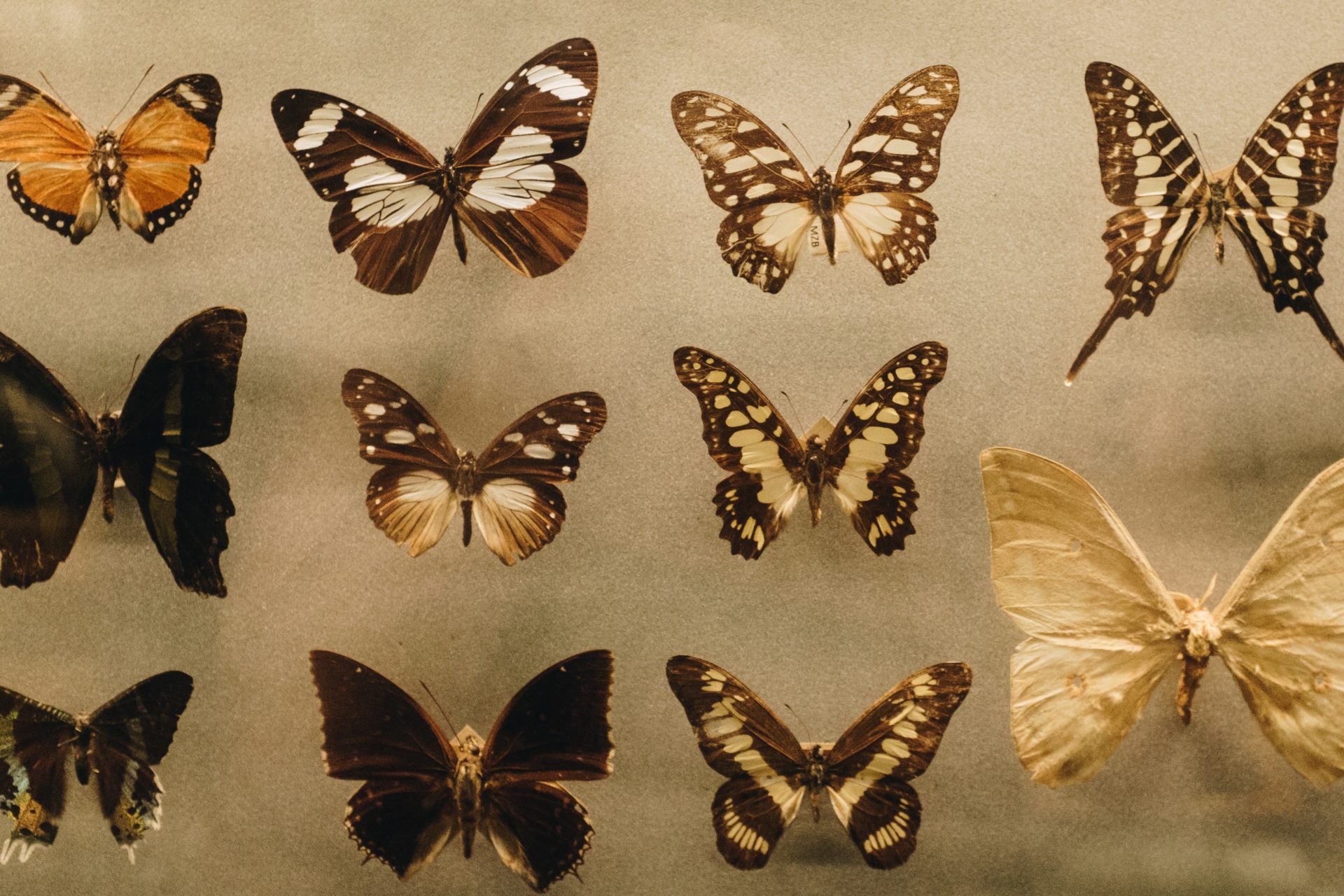← Issue 3

How to Catch a Butterfly
By Emily Huso
Catch it with bare hands. Pinch the wings together and feel the veins chafe between your fingers. Hold it close to your face and inspect the fine antennary bristles, the glossy coil of the proboscis, the composite eyes like shattered glass. Observe as it struggles, legs grasping, tongue lolling, and finally, relax the muscles of your hand and let the thing fly away, leaving fine scales like ground bone on your fingertips.
Butterflies are as fragile as memories, difficult to catch, impossible to preserve perfectly intact. If you go about it the wrong way, they lose their color, fall to pieces in your hands. Still, the impulse is there, when you see that quick flicker of color in the corner of your eye, to make a grab. All you want is a closer look.
A memory: My father dips live butterflies into a steaming pot of water using a pair of surgical forceps. As a girl, maybe six or seven years old at the time, I stand barefoot on a chair dragged close to the stove, grip the counter with sweaty palms, and watch as he suspends a tiger swallowtail in the steam above the pot then plunges it into the bubbles.
I know this memory can’t be right. The water and heat would certainly have destroyed my father’s specimens. Yet, I can still feel the twist in my stomach and the steam on my face, and in my mind persists in perfect clarity the image of the butterfly beating its wings in panic, as if instinct alone could be its preservation.
A memory: In an altercation with my father, my mother stumbles back and catches herself on his desk, upsetting stacks of medical journals and junk mail and the butterfly specimens perched haphazardly throughout the study, their brittle wings poised as if they could fly away at any moment. “Ow!” my mother yelps. She clutches her forearm and slumps back, and my father’s expression goes from angry to alarmed. Without a word, he snatches up the phone book and folds it around my mother’s arm to support the fractured bones. He rushes her to the hospital.
Though my mother doesn’t remember my being in the room throughout this altercation, I know I was there. I remember cowering near the bookcase, my back against the battered encyclopedia spines. I remember crying and begging my parents to stop fighting.
A sort of memory: My mother trips over the dog and fractures her radius.
Alone together in my bedroom for the first time after the incident, she picks a loose thread off her cast and tells me that if anyone asks what happened, this is the story I am to tell. And I do. I recite this tale so many times that it becomes real for me. I see the light coming through the kitchen window, its white glint on clean glasses still warm from the dishwasher. I picture Bernie, my mother’s long-haired dachshund and her faithful shadow, trailing in her footsteps as she puts the dishes away. I hear Bernie’s sharp yelp under my mother’s weight and my mother toppling backward, the piercing sound of splintering glass.
A memory: The summer before we leave him, my father teaches me how to catch a butterfly. It is a typical summer day in Texas. The air is heavy, warm, and wet, but the sky between the clouds is blue.
The target butterfly is the color of sulfur. It tiptoes over the bed of sweet williams, blissfully unaware, and draws deep draughts of nectar. Meanwhile, my father creeps forward, one white tennis shoe after the other sinking into the damp grass. He uses his left hand to distract the butterfly, slowly opening and closing his fingers near its head. The butterfly and I watch the mesmerizing display, and we are both caught by surprise when my father uses his right hand to capture the butterfly from behind.
“Come see,” he says, gesturing me toward him, and I get close enough to make out the pseudopupils and the sharp leg joints and the pink-tipped edges of the wings.
“They’re torn,” I point out hopefully. I know this butterfly’s likely fate.
My father examines the insect more closely. It writhes, its wings shedding as if they will turn to dust. “Good spot,” he says at last. “This one isn’t worth keeping.” His fingers part and the butterfly escapes into the air.
Emily Huso received her MA in English from the California State University, Chico and is currently pursuing her MFA in creative writing at the University of Washington, Seattle. She has served as an assistant editor and guest fiction editor at The Tishman Review. Her poetry appears in Multicultural Echoes.
The Roadrunner Review nominated “How to Catch a Butterfly” for a 2020 Pushcart Prize and for the 2020 Best of the Net.
